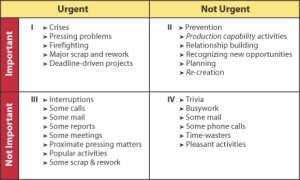Time Management Tips to Save the Day
“Start with the end in mind. ”
– Stephen Covey
If we apply the 80/20 rule to our day, we could safely assume that 80% of our results come from 20% of our efforts.
Wouldn’t it be nice to be able to structure our days so that the most important 20% of our time is dedicated to what would give us the greatest return? So why can’t we?
For most of us, it’s simply a balancing act. It’s easy to create lists of what MUST be done today and what could be put off until tomorrow – but that’s just a list. What’s not on the list are the urgent things that hit us during the day that come along unexpectedly and change the order, sequence and even possibility of achieving even a portion of what we set out to do.
Eisenhower identified the problem when he said , “What is important is seldom urgent and what is urgent is seldom important,”
Stephen Covey took that concept and in “The 7 Habits of Highly Effective People,” created a matrix that helps us set priorities and distinguish between what’s important, what’s urgent and to what degree. It’s a powerful model and as many of you know, one I practice myself.

Figure 1: Stephen R. Covey’s Time-Management Matrix from The 7 Habits of Highly Effective People, New York: Simon & Schuster, 1989, p. 146.
The first thing many of us need to do is differentiate between what’s important from what’s urgent.
For example, it’s important that you strategize and plan for opportunities coming down the pike, but it’s urgent that you meet your client deliverable by the end of the day and it’s just hit a snag.
Naturally what’s urgent takes precedence over what’s important but you need to understand that within each category there will be some things that just take you by surprise during the day and others that you could have planned for had you taken the time to do it before it became urgent, or more important. There’s also the great unknown – crises and situations that arise seemingly from out of nowhere during the day need to be taken care of immediately. That’s top priority and you should plan on leaving some time free to handle them on a daily basis. I also suspect that some things really are ‘knowns’ and could have been avoided with a little foresight.
Now, make a list of everything you need to accomplish during the day and set priorities to it. Include everything – personal things you need to do during the day as well, because truth be told, there’s always something that needs to get done during working hours.
- Prioritize your list by assigning numbers in order of importance, and then draw your matrix:
- Determine which items are urgent and important
- Determine which items are not important but are urgent
- Determine which items are urgent but could wait
- Determine which items are not urgent and not really important
I think you’ll find that by working the matrix, you’ll be able to free up the 20% of your day that will allow you to focus on those important, goal-related activities that will grow your business. It will help put that 80/20 rule to work for you. For example:
- Urgent/Not Important things actually stand in the way of you reaching your goals. Some of these things can either be moved or delegated. Must you hold that meeting today or can you postpone it to a more convenient time. Can you delegate to someone else on your team? Not Urgent/Important are the things we need to leave more time for. Many things in this category require planning, and with proper planning, they do not become Urgent.
- Not Urgent/Not Important. Admittedly, while we tell ourselves the time we spend on Facebook part of our ‘marketing,’ is there someone else on our team we trust with that responsibility? Why do you need to get involved when the printer gets jammed? Can’t someone else can handle that?
There are tons of things and issues and decisions that you need to get involved with on a daily basis. Spend your time where it will best serve you and your company. At the same time, when you find you can delegate to others on your staff, it’s truly a two-fold blessing. It not only takes a bit of the burden off you, it gives them more of a ‘stake’ in the business and makes them part of your combined success.
